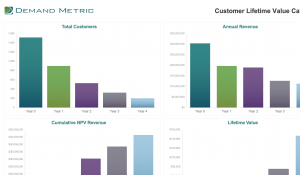How to calculate customer lifetime value (CLV)?
- Jul 5, 2013 9:56 AM
- Completed
Over the years, I have heard a lot of customers asking about how to calculate customer lifetime value. We are considering building an interactive tool to help you calculate customer lifetime value (CLV), but would like to get some feedback from members before we start. Has anyone out there built a customer lifetime value calculator in the past? Would you find value in a customer lifetime value calculator tool?
Vote on this idea to let us know!
UPDATE: this tool has been produced along with a How-To Guide to provide additional information:
Calculating Customer Life-time Value
See Related Tool below...
Use this tool to determine your company's customer lifetime value considering the following factors: Retention Rate, Referral Rate, Interest Rate, # Orders, Average Order Size, Risk Factor, Acquisition Cost, Marketing Cost and Incentives. This tool will automatically calculate the following: Total Customers, Annual Revenue, Costs, Net Revenue, NPV Revenue and Lifetime Value.


7 Responses
Have just multiplied the historical revenues by a target number of years for a 10 or 20 year period to calculate past and projected revenue. I think your customer base would want a tool like this. I can send you a template.
I think metrics like Gross Revenue, Gross Margin would be basic metrics.
Thanks Dan. Please send in the template to info@demandmetric.com(link sends e-mail) so we can check it out. We are planning to build a customer experience management and a CRM methodology and tool-kit in the coming weeks, so I am going to put this tool idea into the On-Deck stage.
Hi Jesse. I for one would most defnitely find value as far a calculator or some form of tool to calculate CLV. The biggest issue I struggle with is the difference between calculating it for end-users (we deal with a subscriber base, thus we have their info and details, B2C environment) and calculating it for our channels (the retailers through which we sell our products/services, B2B enironment). In my opinion calculating the two is different, but in the end the board wants answers on both. It is vital to know the CLV for both to ensure you productively use your resources on those customers that will result in long-term profitability and growth.
I've attempted doing one for the B2C environment, but are still not happy with it. I included what Dan has mentioned in kine as well.
Those are great points Hernus; when you don't have all the input data the calculation can be very difficult. Perhaps you can develop a CLV model for your B2C end customers to start with. Are you trying to figure the actual CLV of the customer through the B2B model, or the CLV of the actual channel partner themselves?
Hi Jesse. In short to your question - both. It is due to the nature of our business, which will probably require some more explanation, as bot the channel partner themselves but also the "final/end" customer requires a CLV calculation.
Our end-customers (private individual consumers) is mainly coming onto our base via the channel partners, thus we "push" our products/services to the end user via our channel partners. Both are therefore "customers'. Knowing the CLV of channel partners (based on probable volumes they can generate for us, current volumes they do generate and then looking at the growth potential within each channel) is the one side.
Once we have the end-user, we need to know the CLV of individual subscribers. Here, hostorical data starts playing a role on customers that are similar to each other. Also, retentions plays a vital role here as those segments of our base that has a higher CLV than other segments needs to be determined so we can place our energy and resources behind those as well as those who are more likely to be retained.
I believe many businesses with subscriber basis might have a similar task of having to know both CLV's as to concentrate the correct resources at the correct segments.
Thanks Hernus. I think I understand what you are trying to do. Perhaps it would be best to set up a call with one of our Analysts to discuss how we can help you specifically with your organization's approach to calculating CLV and then roll out a generalized strategy to the whole community. Would you be open to that idea?
Hi Jesse. I have already scheduled a call and will discuss with the analyst then.